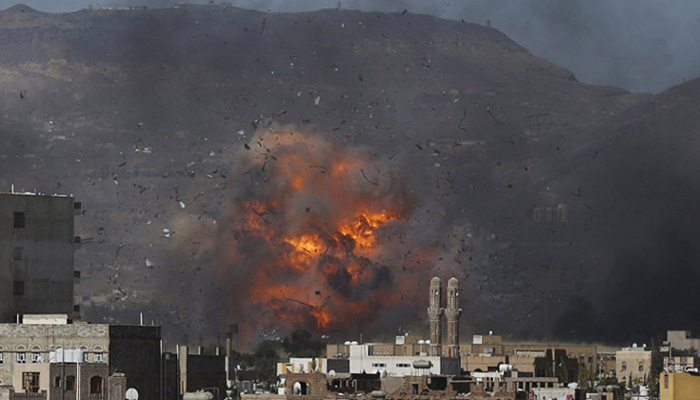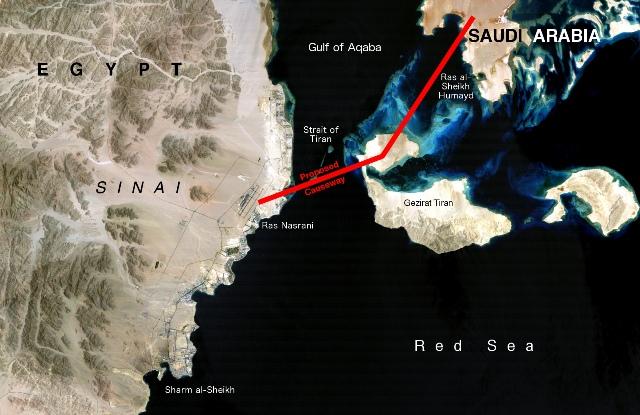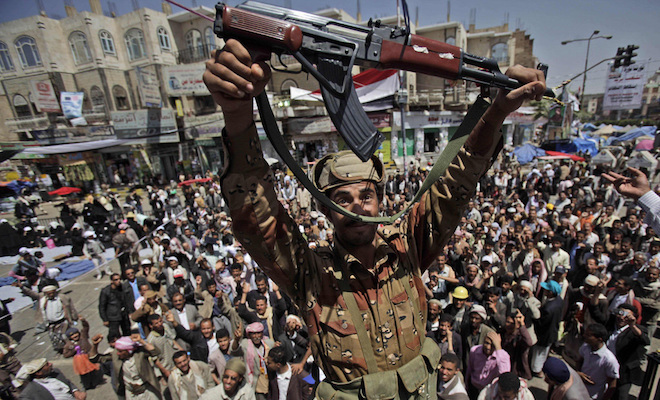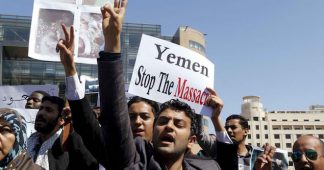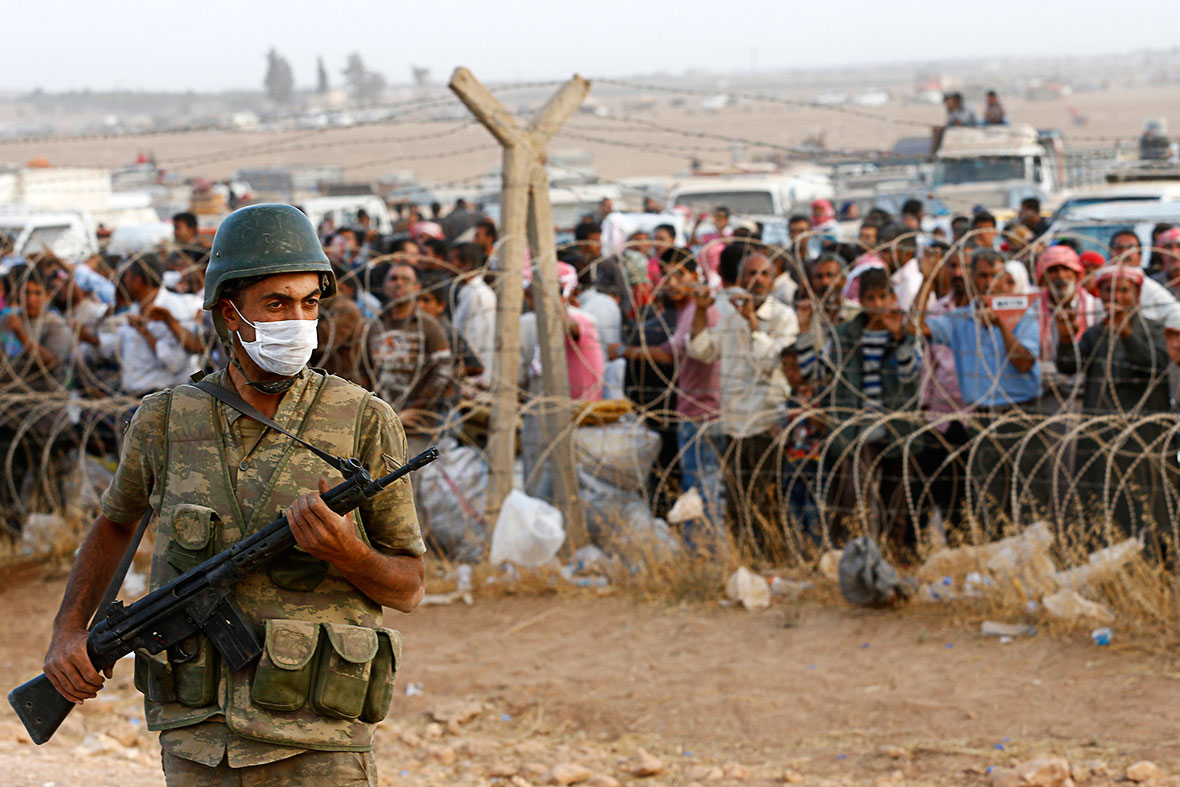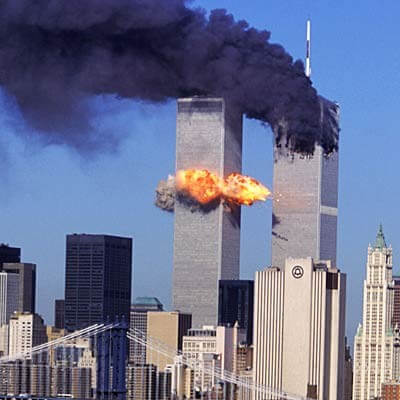Even before the Saudi-led bombing campaign in Yemen began more than a year ago, Yemen was ranked as one of the poorest countries in the world. But now, a year and a half into the war, Yemen’s health system has broken down, and the population is facing the threat of starvation. For more, we’re joined by Andrew Cockburn, the Washington editor for Harper’s magazine. His latest piece for Harper’s is headlined “Acceptable Losses: Aiding and Abetting the Saudi Slaughter in Yemen.” He is author of “Kill Chain: The Rise of the High-Tech Assassins.”
TRANSCRIPT
This is a rush transcript. Copy may not be in its final form.
AMY GOODMAN: As we continue covering Saudi Arabia’s war in Yemen, we turn to Andrew Cockburn, Washington editor for Harper’s magazine. His latest piece for Harper’s is headlined “Acceptable Losses: Aiding and Abetting the Saudi Slaughter in Yemen.”
Andrew Cockburn’s piece begins, “Just a few short years ago, Yemen was judged to be among the poorest countries in the world, ranking 154th out of the 187 nations on the U.N.’s Human Development Index. One in every five Yemenis went hungry. Almost one in three was unemployed. Every year, 40,000 children died before their fifth birthday, and experts predicted the country would soon run out of water.
“Such was the dire condition of the country before Saudi Arabia unleashed a bombing campaign in March 2015, which has destroyed warehouses, factories, power plants, ports, hospitals, water tanks, gas stations, and bridges, along with miscellaneous targets ranging from donkey carts to wedding parties to archaeological monuments. Thousands of civilians—no one knows how many—have been killed or wounded. Along with the bombing, the Saudis have enforced a blockade, cutting off supplies of food, fuel, and medicine. A year and a half into the war, the health system has largely broken down, and much of the country is on the brink of starvation.”
Those the words of Andrew Cockburn, the Washington editor for Harper’s magazine. He joins us now from Washington.
Welcome to Democracy Now!, Andrew Cockburn. Talk about the U.S. support for Saudi Arabia and what Saudi Arabia is doing in Yemen.
ANDREW COCKBURN: Well, the U.S. support has been basically unconditional. I mean, there have been some sort of behind-the-scenes grumbles and efforts to sort of suggest that they might tone it down a bit. But, basically, from the very beginning, the support, as your previous guest was saying, has not only been consisted of supplying arms continually through the—through the war, and certainly before the war, but also fully fledged diplomatic support. I mean, at the beginning of the war, the Saudis effectively sponsored a U.N. resolution, which basically called for the other side, the Houthis, who controlled the capital and large parts of the country, to unconditionally surrender and go back home to the area they came from. The U.S. supported that, which was obviously going to—you know, was no peace—no way to a peaceful solution, was going to continue the war.
Later, in about last fall, the Dutch government introduced a resolution saying that the—that there should be an independent investigation of war crimes by both sides, by all sides in Yemen. The U.S., again, effectively worked—took the lead in killing that initiative, to make sure that didn’t happen. In fact, in the course of researching this article, I talked to a very senior State Department official, and I said, “Well, you know, did you do that? Why did you do that?” And he said, “Well, we agreed with President Hadi.” President Hadi, of course, is the Saudi pawn, the so-called president, who has been living in Riyadh for most of the war. It’s been—it’s a very shocking story of just how casually we’ve enabled—the U.S. has enabled, not just by supplying the weapons, but by giving diplomatic backup, to this ongoing sort of casual war crime.
AMY GOODMAN: What is Saudi Arabia and the U.S. hoping to accomplish in Yemen?
ANDREW COCKBURN: Well, that’s a great question. The U.S., it’s not clear at all. The Saudis, basically—I mean, in the article, I go at some length into the sort of background to all this. But basically, they got freaked out at the thought that Iran was establishing a beachhead on their southern border, which was really kind of hysterical paranoia, because Iran wasn’t really doing that. I mean, they were making some kind of connection with the Houthis, who are a religious minority, tribal minority, living in northern Yemen, but there was very little prospect of Iran setting up bases and so on and so forth. And the U.S. just kind of—and so, the Saudis got more and more sort of outraged as the Houthis took power in Yemen, or seemed to be taking over the country.
And the U.S. kind of went along with it. I mean, I was told, very early on in the war, Deputy Secretary of State Tony Blinken went to Riyadh to ask the—this is two weeks—yeah, it was two weeks into the war, when they had already been bombing away, using the U.S. bombs, U.S.-supplied bombs, using U.S. weapons, killing already dozens, if not certainly, you know, hundreds of civilians, destroying factories. And finally, Blinken turns up in Riyadh and asks, “By the way, what are you trying to accomplish here?” And the Saudis effectively said, or at least the Americans understood them to say, “Well, we basically want to wipe out the Houthis.” Well, they termed it as “end all Iranian influence in Yemen.” So, the Americans—Blinken was a bit shocked by that, so I’m told, and said, “Well, you know, that’s going a bit far. But it’s—you should certainly stop the Houthis taking over the country.” And that, effectively, gave the Saudis carte blanche to continue this kind of mindless carpet bombing, in effect, that they’ve—that’s been going on almost ever since. There’s been a bit of a lull over the summer, when you had the peace talks going on.
But, otherwise, it’s this—and as you mentioned at the beginning, reading the bit in the beginning of my article, this was a desperately poor country, you know, with the terrible conditions. Everyone was—human rights people, you know, humanitarian workers were desperately worried about Yemen before a single bomb was dropped, and now thousands and thousands and thousands of bombs have been dropped, effectively destroying Yemen. They’ve destroyed most of the health system. They destroyed schools. Human Rights Watch did an excellent report pointing out that they’ve attacked—consistently attacked economic targets having nothing to do with any kind of war effort, but like potato chip factories, water bottling factories, power plants. It’s an effort to destroy Yemen. And that’s what, as Kristine said, we are part of that. This is our war, and it’s shameful.
I mean, I’ll give you one quick example. Yes, everyone is horrified by Syria and what’s going on there, and quite rightly so. And we’ve had this picture of that poor Syrian child that’s gone viral. Yesterday, The New York Times had one—you know, had a piece saying one—a picture of one Syrian child went viral, but here are seven others, so seven other children that got similarly affected. And I thought, “Oh, maybe they’ll mention a Yemeni.” Not so. Syrian other—seven other unfortunate Syrian children. But I defy you to find a single picture in The New York Times or any other mainstream New York media of any of the hundreds, if not thousands, of Yemeni children, because no one really knows how many have been wounded or killed by the Saudi bombing.
AMY GOODMAN: Last August, Red Cross President Peter Maurer went to Yemen. He said Yemen, after five months, looks like Syria after eight years—no, he said Yemen after five months looks like Syria after five years.
ANDREW COCKBURN: Yes, isn’t that a shocking, a shocking—I mean, that—we’ve heard so much about Syria, and yet, you know, the Saudis have been on fast-forward—and us—I have to keep reminding us of that. We—our war in Yemen has been on fast-forward. And we’ve, you know, just done devastating damage to the country. And I quote in my piece—you know, I asked a senior State Department official, “What was the Saudi plan when they started this bombing campaign? What was the strategy for the bombing?” And he got a bit exasperated. He said, “Plan? There was no plan. They simply bombed anything and everything.” Anything might be a military target. You know, trucks on the highway, that became a military convoy. And when they did find a military target, they bombed it and bombed it and bombed it again.
So, it seems indiscriminate, although, interestingly, I mean, we’ve had these recent atrocities of the Médecins Sans Frontières hospital, the fourth one they hit, that they hit last week, plus the schools. But there was another. There was an important bridge, which was a sort of route to carrying food supplies, essential supplies up from the port, up from Hudaydah. They hit that, as a way, you know, effective means of increasing the hunger level and the general distress level in Sana’a. So, this is a very, very, very cruel war that we are helping to wage.
AMY GOODMAN: U.S. Connecticut Senator Chris Murphy has spoken out against U.S. support for the Saudi-led bombing campaign in Yemen. He was speaking to CNN’s Jake Tapper last week.
SEN. CHRIS MURPHY: There is an American imprint on every civilian life lost in Yemen. Why? Well, it’s because though the Saudis are actually dropping the bombs from their planes, they couldn’t do it without the United States. It’s our munitions, sold to the Saudis. It’s our planes that are refueling the Saudi jets. And it’s our intelligence that are helping the Saudis provide their targeting. We have made a decision to go to war in Yemen against a Houthi rebel army that poses no existential threat to the United States. It’s really wild to me that we’re not talking more about this in the United States. The United States Congress has not debated a war authorization giving the president the power to conduct this operation in Yemen.
AMY GOODMAN: Senator Murphy went on to say that Congress can put an end to arms sales to Saudi Arabia. Now, what about this, Andrew Cockburn? Is this about Yemen, or is this simply about President Obama supporting the U.S. arms industry?
ANDREW COCKBURN: Well, it’s very little to do with Yemen, because we—you know, it’s clear we don’t care about Yemen. I mean, there’s little groups in the State Department and elsewhere who do, maybe. But, no, we don’t care much about Yemen, and we don’t care if we destroy it. What we do care about is the health and well-being of the U.S. arms industry.
I mean, I’ll give you a little example: In 2010 or the end of—the U.S. announced, or it was announced that the—the largest arms sale in U.S. history, which was a $60 billion sale of warplanes, of F-15 jets, plus bombs and missiles and missile guidance, bomb guidance systems and all the rest, that they’ve been using ever since. That was—if you look in the Hillary Clinton’s released emails, you will find a sort of round of celebration: good news, a Christmas present. This was all part of the strategy, which the Obama administration has been pursuing since the beginning, of increasing arms sales abroad.
And remember, it’s not just, you know, the actual sort of things that we think of of weapons—I mean, the bomber plane, the F-15 planes, the missiles, the bombs. It’s also the whole infrastructure that keeps them going. I mean, I looked into this, the huge contracts that are being—that are in place to service, to keep the whole machine running. Senator Murphy, in his excellent statement, he could have mentioned one other thing, which is the fact that these planes are largely maintained—I mean, what keeps them in the air are the teams of American contract workers who are on the ground. If you look on job search sites, you’ll find job opportunities in Saudi Arabia to service F-15, maintain F-15 planes and everything else that’s required to keep this war going.
So, in so many ways, we are part of this, and very profitably so—I mean, not just the $110 billion you mentioned. I believe—I could be wrong, but it’s roughly—we have 7,000 people on the production line at the Boeing plant in St. Louis working on this huge Saudi F-15 order. And I’ve seen a figure that, across the country, in terms of subcontractors doing the bits that go in to make these planes, perhaps as many as another 30,000 or 35,000 workers around the country. This is a huge number of jobs and a huge amount of money. So, in a way, given the sort of values system that we have here today, it’s really no surprise that we’re doing this.
AMY GOODMAN: In June, U.N. Secretary-General Ban Ki-moon removed the U.S. Saudi-backed—Saudi-led coalition fighting Houthi rebels in Yemen from a blacklist of forces responsible for killing children. Ban Ki-moon later acknowledged he was coerced into removing Saudi Arabia from the blacklist of forces responsible for killing children, after the kingdom threatened to cut off funding to the U.N. This is what he said.
SECRETARY-GENERAL BAN KI-MOON: The report describes horrors no child should have to face. At the same time, I also had to consider the very real prospect that millions of other children would suffer grievously if, as was suggested to me, countries would defund many U.N. programs. Children already at risk in Palestine, South Sudan, Syria, Yemen and so many other places would fall further into despair. It is unacceptable for member states to exert undue pressure.
AMY GOODMAN: That’s U.N. Secretary-General Ban Ki-moon. Andrew Cockburn?
ANDREW COCKBURN: Well, isn’t that—isn’t this shocking, I mean, that this—that our, you know, supreme international body has to, you know, as it admits, cravenly crumble before this bandit regime, threatening, saying, “Well, if you don’t—if you criticize us for going around killing children, we’re going to starve a few more?” I mean, that is just disgraceful on the strength of it, quite apart from everything else we’ve been talking about, about the weapons. I think they should have been—well, I mean, it’s an absurd joke that they should be on the Human Rights Council, for a start. I mean, it’s really a sick joke that these people should be allowed to say anything about human rights, you know, for all the reasons people know very well, not just what’s going on in Yemen, but everything that goes on in Saudi Arabia, for that matter.
AMY GOODMAN: Why is the U.S. relationship with Saudi Arabia sacrosanct, it seems? And what do you take—what do you think of the media coverage of Saudi Arabia?
ANDREW COCKBURN: Well, you know, the relationship goes back. I mean, sort of we could go back to when the Saudi Arabia—the Americans sort of forged the alliance, the relationship, in 1945, when Roosevelt met with the king of Saudi Arabia, and they really came to a deal: The U.S. would support the regime and keep this family, who named the country after themselves, the House of Saud, keep them in power—that was the deal—in exchange for a guarantee of cheap oil supplies to this country. I mean, not many people know that, actually, up until 2002, they actually did subsidize the price of oil, you know, Saudi oil that came to this country. There’s other things that go along with it, like overflights, you know, that we wouldn’t—it would be very inconvenient for us sort of to run those huge bases we have in the Gulf, in Doha and Bahrain, if we weren’t allowed to fly over Saudi Arabia, which they—they make it clear that’s a conditional right. Once in a while, I was told by a former ambassador, they refuse permission. So, there’s things like that.
But I think, first and foremost, it’s all about money, you know, this $110 billion we’ve been talking about repeatedly, which was only the latest—that’s only under Obama, let alone what’s gone on in previous years, but, you know, the huge amount of money that washes into Washington. You know, there’s been revelations in recent days of the amount the Saudis gave the Clinton campaign, the number of lobbyists in Washington that are on the Saudi payroll. It’s a very—you know, it’s really a relationship sort of lined with gold, that that’s sort of become a matter of habit.
You know, that the—you know, I talk in the article about, for example, in just outside Riyadh, there’s a big—quite a big housing compound with several thousand Americans, whose job is—it’s the U.S. military training mission to the Saudi armed forces. And that’s been there permanently since—I think since the early ’50s. In fact, it was agreed on at that historic meeting in 1945. It’s always run by a two-star Air Force or Army general. The Saudis pay $30 million a year to have this training mission, which is also, as it says in its mission statement on its web—mission statement, its job is to sell U.S. weapons to Saudi Arabia. So, you know, it’s a relationship, I think, fundamentally built on arms sales.
AMY GOODMAN: I wanted to read to you an article, an excerpt, from David Sirota, headlined “Clinton Foundation Donors Got Weapons Deals from Hillary Clinton’s State Department.” Sirota wrote, quote, “In the years before Hillary Clinton became secretary of state, the Kingdom of Saudi Arabia contributed at least $10 million to the Clinton Foundation, the philanthropic enterprise she has overseen with her husband, former president Bill Clinton. Just two months before the deal was finalized, Boeing—the defense contractor that manufactures one of the fighter jets the Saudis were especially keen to acquire, the F-15—contributed $900,000 to the Clinton Foundation, [this] according to a company press release.” Those are the words of David Sirota. Andrew Cockburn?
ANDREW COCKBURN: Well, I mean, commentary is almost superfluous. I mean, there you have it. The Saudis put $10 million into the Clinton Foundation; the Boeing corporation puts $900,000. In fact, in those Clinton emails I referred to earlier, you know, they’re saying—when they’re all, Clinton and her staff, are celebrating that giant weapons sale, F-15s and weapons sale in 2010, they’re saying, “Get on to the Boeing corporation, and tell them the good news.” I mean, it’s—someone once said that the business of the U.S. government is to acquire arms at home and sell arms abroad. And I think this is a very good example of that.
AMY GOODMAN: Finally, what do you think needs to happen?
ANDREW COCKBURN: Well, for a start, we should sort of cut off this—you know, cut off—resign from this war. I mean, you know, as Kristine said, we are part of this war, so we should quit. We should not be supplying any more weapons. We should not be supplying intelligence. We should try—I mean, might be contractually difficult, but we should suddenly cut off the flow of American contract workers, you know, who are servicing these planes. We should make it clear that we’re not part of this.
We should also—I think, you know, that the Saudis, of course, will be hysterical about it, but we should make it clear that we are—you know, we are doing that, and we are working—would try and work for a—you know, for some kind of peaceful solution, before there’s anything left of Yemen, which is not much, as far as I can see at the moment, but something, you know, that the Saudi-backed side has to stop demanding the unconditional surrender of the Houthis. On the other hand, the Houthis and their ally, former President Saleh, who, I must say, is certainly no angel himself, have to be given some inducement, perhaps by us working with the Iranians or in some way persuading them that they have to settle for less than maximal success. But we have to stop—we have to quit this war. I mean, it’s unconscionable, what’s going on.
AMY GOODMAN: Andrew Cockburn, I want to thank you for being with us, Washington editor for Harper’s magazine. We’ll link to your latest piece, “Acceptable Losses: Aiding and Abetting the Saudi Slaughter in Yemen.”
This is Democracy Now! When we come back, we go to Chicago. Stay with us.
